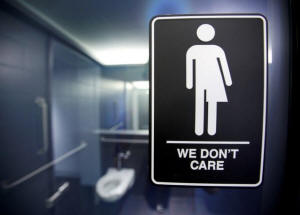|
U.S. guidance on school restroom choice
opposed by some states
 Send a link to a friend
Send a link to a friend
[May 14, 2016]
By Colleen Jenkins
(Reuters) - Transgender students cheered
the Obama administration's directive on Friday requiring U.S. public
schools to allow them to use toilets and locker rooms consistent with
their gender identity while some school districts said they would not
comply.
|

A sign protesting a recent North Carolina law restricting transgender
bathroom access adorns the bathroom stalls at the 21C Museum Hotel in
Durham, North Carolina May 3, 2016. REUTERS/Jonathan Drake |
|
 "This is the strongest guidance to date from the federal
government to schools instructing them on how they must treat
transgender students fairly and without discrimination," said Ilona
Turner, legal director at the Transgender Law Center in California. "This is the strongest guidance to date from the federal
government to schools instructing them on how they must treat
transgender students fairly and without discrimination," said Ilona
Turner, legal director at the Transgender Law Center in California.
"This will be something that courts will have to give great weight
to."
The letter, signed by officials from the U.S. Education and Justice
Departments, intensified the debate over balancing equal rights with
privacy concerns.
The Obama administration told U.S. public schools on Friday that
transgender students must be allowed to use the bathroom of their
choice, upsetting Republicans and raising the likelihood of fights
over federal funding and legal authority.
Transgender student Gavin Grimm, who won a U.S. appeals court ruling
in April in his fight over bathroom access at his Virginia high
school, said he was happy with the support from the Obama
administration.
"This guidance would have made a big difference in my life," he
wrote on Twitter.
 Educators are facing scrutiny and legal action over access to
toilets and locker rooms based on gender identity versus a student's
sex at birth.
The federal government's position is that U.S. laws against sex
discrimination in educational programs include gender identity.
Friday's directive was the broadest attempt to enforce that stance
on a national basis.
But North Carolina's Lieutenant Governor Dan Forest said in a
statement that the state would "not stand by and let our locker
rooms and high school showers be used for social experimentation at
the expense of the privacy and protection of our young boys and
girls."
Forest advised schools to reject the policy and said a state law
enacted in March restricting bathroom choice for transgender people
trumped the administration's "non-binding directive."
North Carolina is locked in a high-profile legal battle with the
federal government over its "bathroom bill." On Monday, Republican
leaders of the state's legislature said they had sued the U.S.
Justice Department over the state's law restricting public bathroom
access for transgender people.
That lawsuit came hours after North Carolina Governor Pat McCrory
sued the Justice Department, accusing it of overreaching after
federal lawyers said the state's law requiring public bathroom use
based on birth gender was a civil rights violation.
In Florida, Marion County Public Schools showed no sign of backing
down from a resolution passed in April requiring students to use the
bathroom that corresponds with the gender on their birth
certificate.
[to top of second column] |

"I don't believe our board will reverse the decision unless it is
instructed by the courts," the school system's spokesman Kevin
Christian said in a telephone interview.
Mississippi's Department of Education said it would comply with the
federal guidance.
MUNICIPALITIES ACT
New York City Mayor Bill de Blasio signed an executive order in
March allowing a person of any gender to choose whether to use a
men's or women's toilet or locker room in all municipal properties
including public parks, pools, and playgrounds. The order requires
city agencies to post the policy in conspicuous locations within
three months and to train all employees within two years.
New York City's action came a week after South Dakota Governor
Dennis Daugaard vetoed a bill that would have made the state the
first to limit transgender students to bathrooms and locker rooms
that correspond with their birth gender.
In November, Houston voters overwhelmingly rejected a measure known
as the "bathroom ordinance" that would have established
non-discrimination protections for gay and transgender people.
Nationwide, 22 percent of transgender and gender non-conforming
people report being denied access to appropriate bathrooms at work,
and 26 percent report being denied access to bathrooms in an
educational setting, according to a survey conducted by the National
Center for Transgender Equality and the National Gay and Lesbian
Task Force.
(Reporting by Colleen Jenkins; Additional reporting by Letitia
Stein; Editing by Toni Reinhold)
[© 2016 Thomson Reuters. All rights
reserved.]
Copyright 2016 Reuters. All rights reserved. This material may not be published,
broadcast, rewritten or redistributed.

 |